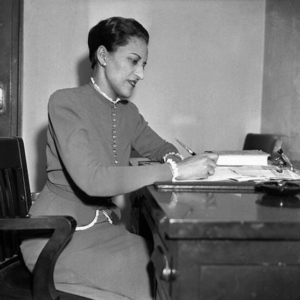
After becoming the first African American woman to earn a degree from Yale Law School in 1931, Bolin was already laying the foundation of an impressive career as a lawyer with her father’s firm in her hometown on Poughkeepsie, New York, and later with her husband when the two moved to New York and practiced there together there for several years.
In 1937, Bolin applied for a position in the city’s law office, the Office of the Corporation Counsel of the City of New York. She was initially denied during an interview with an assistant, but was later hired on the spot by Corporation Counsel Paul Windels, making her the first African American woman to be appointed Assistant Corporation Counsel.
After two years of working this position in Domestic Relations Court representing those who could not afford legal aid, she was summoned to meet with New York’s then Mayor Fiorello La Guardia. Fearful that someone had complained about her performance, Bolin anticipated that her job might be in jeopardy. La Guardia gave her the surprise of a lifetime when she realized that she was not there to be fired, but to be sworn in as the country’s first African American female judge.
Bolin spent the next 40 years becoming known as a thoughtful and unyielding force on the bench, fighting to eradicate racial injustices and improve the plight of young African American youth, as well as reforming the juvenile system itself. Her groundbreaking rulings would make major improvements to the lives of Black families and youth for years to come.
But it was not with red carpet treatment that Bolin was welcomed into the world of Ivy League and lawmaking. In various interviews, she recounted stories of injustice that made her journey to the judicial bench a difficult one. During her time at Yale, she faced harsh discrimination and social isolation from classmates and faculty alike.
“My college days for the most part evoke sad and lonely personal memories,” Bolin said. “These experiences perhaps were partly responsible for my lifelong interest in the social problems, poverty and racial discrimination rampant in our country.”
After her husband died in 1943, Bolin had to raise her son, Yorke, as a single mother for several years while still presiding on the bench, until she remarried in 1950. Ultimately, she was reinstated three times as judge, and retired at age 70. Bolin continued to make strides in her community as a consultant and volunteer in local schools, until her death in Long Island City, Queens, New York, in 2007 at the age of 98.
Sources say Bolin saw herself as “a guardian for the whole city and for all children in need.”
“I’ve always done the kind of work I like,” she told the New York Times at the time of her retirement. “I don’t want to sound trite, but families and children are so important to our society, and to dedicate your life to trying to improve their lives is completely satisfying.”
